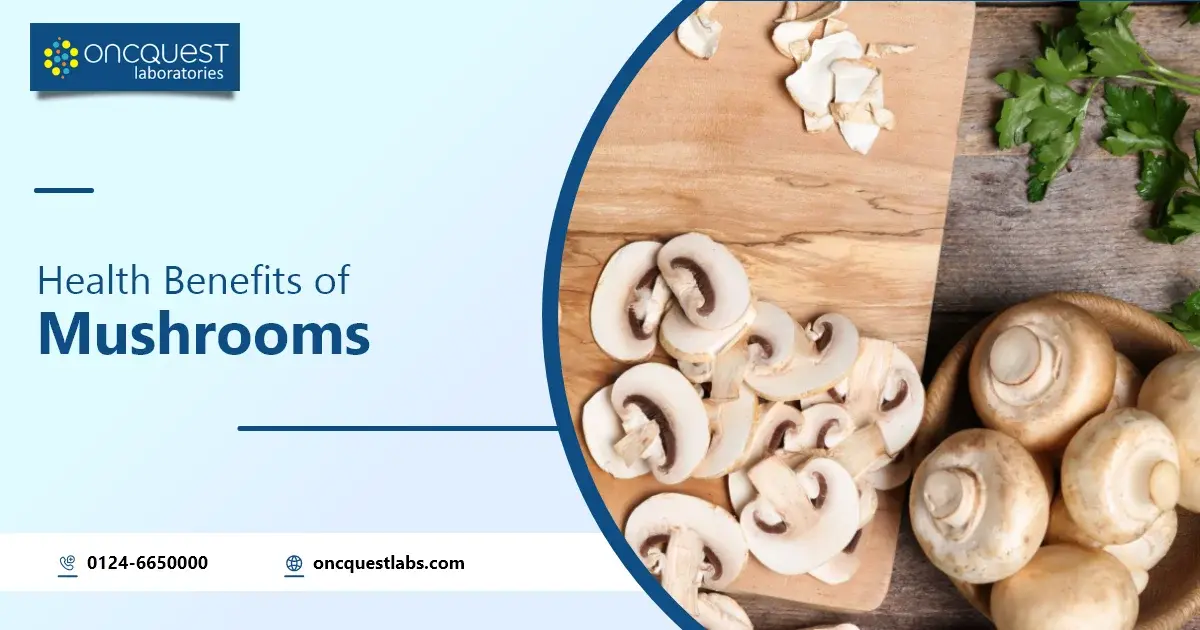Mushrooms, often celebrated for their rich umami flavor and culinary versatility, have recently garnered significant attention for more than just their taste. Beyond being a delicious addition to dishes, mushrooms pack a punch when it comes to nutrition and health benefits. In this blog, we’ll delve into the myriad ways mushrooms contribute to well-being, exploring their nutritional profile, immune-boosting properties, potential in cancer prevention, and much more. So, let’s embark on a journey through the fascinating world of mushrooms and discover how they can nourish both body and mind.
Contents
Nutritional Value of Mushrooms
Sure, here’s a table detailing the approximate nutritional value of mushrooms per 100 grams:
| Nutrient | Amount per 100g |
| Calories | 22 kcal |
| Protein | 3.1 g |
| Fat | 0.3 g |
| Carbohydrates | 3.3 g |
| Fiber | 1.3 g |
| Sugar | 1.7 g |
| Vitamin D | 0.1 µg |
| Vitamin B2 | 0.4 mg |
| Vitamin B3 | 3.7 mg |
| Vitamin B5 | 1.5 mg |
| Vitamin B7 | 2.5 µg |
| Selenium | 13.9 µg |
| Copper | 0.3 mg |
| Potassium | 318 mg |
Please note that these values are approximate and can vary depending on the type of mushroom and growing conditions. Always refer to specific nutritional information for the type of mushroom you’re consuming for the most accurate values.
Health Benefits of Mushroom
Mushrooms offer a wide range of health benefits due to their rich nutritional profile and unique bioactive compounds. Here is a detailed look at their health benefits:
1. Nutrient-Rich
Mushrooms are nutrient-rich, offering a wealth of vitamins and minerals while being low in calories. They are a good source of B vitamins, such as riboflavin, niacin, and pantothenic acid, which support energy metabolism and brain health. Additionally, mushrooms provide important minerals like selenium, copper, and potassium, essential for antioxidant defense, immune function, and heart health. They also contain unique compounds like beta-glucans and ergothioneine, which have immune-boosting and antioxidant properties, contributing to overall wellness.
2. Antioxidant Properties
Mushrooms are rich in antioxidants, particularly ergothioneine and selenium, which protect the body from oxidative stress and cellular damage. These antioxidants neutralize free radicals, reducing the risk of chronic diseases such as cancer and heart disease. Ergothioneine, a unique antioxidant found abundantly in mushrooms, supports cellular health and has neuroprotective effects. Regular consumption of mushrooms can enhance the body’s antioxidant defenses, promoting overall health and longevity. Their potent antioxidant properties make mushrooms a valuable addition to a balanced diet.
3. Immune System Support
Mushrooms boost immune system support due to their high content of beta-glucans, which enhance the activity of immune cells like macrophages and natural killer cells. These compounds help the body fight off infections and diseases more effectively. Additionally, mushrooms contain selenium, which plays a crucial role in the immune response and inflammation control. Regular consumption of mushrooms can strengthen the body’s defense mechanisms, making it more resilient to common illnesses such as colds and flu, while also providing ongoing immune maintenance.
4. Anti-Cancer Potential
Mushrooms possess significant anti-cancer potential due to their bioactive compounds like beta-glucans, lectins, and polysaccharides, which have been shown to inhibit tumor growth and enhance the immune system’s ability to fight cancer cells. Specific varieties, such as shiitake, maitake, and reishi, are particularly noted for their anti-carcinogenic properties. These compounds work by inducing cancer cell apoptosis, inhibiting angiogenesis, and modulating immune responses. Regular consumption of mushrooms may contribute to a reduced risk of various cancers, making them a valuable addition to a health-conscious diet.
5. Heart Health
Mushrooms contribute to heart health through their cholesterol-lowering effects and high levels of antioxidants. They contain compounds like beta-glucans and fiber, which help reduce bad cholesterol (LDL) levels. Additionally, mushrooms are rich in potassium, which helps regulate blood pressure by balancing the negative effects of sodium. The antioxidants in mushrooms, such as ergothioneine and selenium, combat oxidative stress and inflammation, further protecting the heart. Regular consumption of mushrooms can thus support cardiovascular health and reduce the risk of heart disease.
6. Digestive Health
Mushrooms support digestive health by providing a rich source of dietary fiber, which aids in maintaining regular bowel movements and preventing constipation. Their prebiotic properties help nourish beneficial gut bacteria, promoting a balanced microbiome and improving overall gut health. Additionally, certain compounds in mushrooms, such as polysaccharides, can enhance the gut’s immune function. Including mushrooms in your diet can contribute to a healthier digestive system, reducing the risk of gastrointestinal disorders and enhancing nutrient absorption.
7. Brain Health
Mushrooms support brain health by providing essential nutrients and compounds that enhance cognitive function and protect against neurodegenerative diseases. They contain antioxidants like ergothioneine and selenium, which help reduce oxidative stress and inflammation in the brain. Some varieties, such as lion’s mane, have been shown to stimulate nerve growth factor (NGF) production, promoting brain cell growth and repair. Regular consumption of mushrooms can improve memory, focus, and overall cognitive performance, making them a valuable addition to a diet aimed at maintaining brain health.
8. Anti-Diabetic Effects
Mushrooms may help manage diabetes due to their low glycemic index and high fiber content, which can regulate blood sugar levels. They contain bioactive compounds like polysaccharides and beta-glucans that improve insulin sensitivity and reduce insulin resistance. Additionally, antioxidants in mushrooms help combat oxidative stress, which is linked to diabetes complications. Incorporating mushrooms into a balanced diet can support blood sugar control and overall metabolic health, making them a beneficial food choice for individuals with diabetes.
9. Skin Health
Mushrooms are beneficial for skin health due to their high content of antioxidants like selenium and vitamin D, which protect skin cells from damage caused by free radicals. They also contain polysaccharides that help retain moisture, keeping the skin hydrated and supple. Additionally, mushrooms’ anti-inflammatory properties can reduce redness and irritation, promoting a clearer complexion. Regular consumption of mushrooms can enhance skin elasticity, combat signs of aging, and support overall skin wellness, making them a valuable addition to a skin-healthy diet.
10. Cancer Prevention
Mushrooms offer potential in cancer prevention due to their rich array of bioactive compounds. Certain varieties, like shiitake and maitake, contain polysaccharides and beta-glucans that exhibit anti-cancer properties, inhibiting tumor growth and boosting the immune system. Additionally, mushrooms are abundant in antioxidants and phytonutrients, which combat oxidative stress and inflammation, both of which are linked to cancer development. Incorporating mushrooms into a balanced diet may contribute to reducing the risk of various types of cancer, making them a valuable addition to cancer prevention strategies.
Incorporating mushrooms into your diet can provide a range of health benefits and contribute to overall wellness.
Mushroom Side Effects
While mushrooms offer numerous health benefits, it’s important to be aware of potential side effects, especially when consuming wild mushrooms or in large quantities. Some potential side effects include:
Digestive Issues
Digestive issues, such as bloating, gas, and diarrhea, can occur after consuming mushrooms in some individuals, particularly those with sensitivities or underlying digestive conditions. The high fiber content and specific compounds in mushrooms may be difficult for some digestive systems to process, leading to discomfort. To minimize digestive issues, it’s essential to consume mushrooms in moderation, ensure they are thoroughly cooked, and consider starting with small amounts to gauge tolerance. If symptoms persist or worsen, consulting with a healthcare professional is advisable.
Allergic Reactions
Allergic reactions to mushrooms can manifest as itching, swelling, hives, or, in severe cases, anaphylaxis. Individuals with mushroom allergies should avoid all mushroom varieties to prevent adverse reactions. It’s crucial to read food labels carefully and inquire about mushroom ingredients when dining out. Additionally, cross-contamination can occur in kitchens, so those with allergies should be vigilant when consuming dishes prepared alongside mushrooms. Seeking medical advice and carrying an epinephrine auto-injector are essential precautions for individuals with known mushroom allergies.
Toxicity
Toxicity from mushrooms can result in serious health consequences, including organ failure and death. Certain wild mushrooms closely resemble edible varieties, making proper identification critical. Consumption of toxic mushrooms can lead to symptoms such as nausea, vomiting, abdominal pain, diarrhea, and even neurological symptoms. In severe cases, it can cause liver or kidney damage. To avoid toxicity, it’s essential to only consume mushrooms from reputable sources and be cautious when foraging. If poisoning is suspected, seek immediate medical attention.
Interactions with Medications
Certain mushrooms, particularly medicinal varieties like reishi or cordyceps, may interact with medications. These mushrooms contain bioactive compounds that could affect the metabolism of certain drugs, potentially altering their effectiveness or causing adverse reactions. If you are taking medication, especially blood thinners, immunosuppressants, or medications for diabetes or hypertension, consult with your healthcare provider before incorporating mushroom supplements into your routine. They can provide guidance on potential interactions and ensure your safety while benefiting from the health-promoting properties of mushrooms.
Heavy Metal Accumulation
Mushrooms, particularly wild varieties, possess a remarkable ability to absorb and accumulate heavy metals from the environment. This characteristic makes them susceptible to contamination with metals like lead, cadmium, and mercury, which can pose health risks when consumed in large quantities. Regular consumption of mushrooms, especially those sourced from polluted areas or grown in contaminated soil, may lead to heavy metal toxicity over time. To minimize this risk, it’s essential to source mushrooms from reputable sources and ensure they are grown in controlled environments free from environmental pollutants.
Psychological Effects
Some mushrooms, such as magic mushrooms containing psilocybin, can induce profound psychological effects, including altered perception, hallucinations, and changes in mood and cognition. While these effects are sought after by some individuals for recreational or therapeutic purposes, they can also pose risks, especially for those with underlying mental health conditions or a predisposition to psychosis. It’s essential to approach the use of such mushrooms with caution and under controlled settings to minimize the potential for adverse psychological reactions and ensure safety.
To minimize the risk of side effects, it’s essential to consume mushrooms from trusted sources, properly identify wild mushrooms before consumption, and moderate intake, especially if you are trying new varieties for the first time. If you experience any adverse reactions after consuming mushrooms, discontinue use and seek medical attention if necessary.
Mushrooms for Weight Loss
Mushrooms can be a helpful addition to weight loss efforts due to their unique nutritional composition. Low in calories and fat, yet high in fiber and water content, mushrooms provide satiety without adding excess calories to meals. This can help individuals feel full and satisfied while consuming fewer overall calories, supporting weight loss goals. Furthermore, mushrooms are rich in various vitamins, minerals, and antioxidants, providing essential nutrients without contributing to weight gain. Their versatility in recipes allows for creative and flavorful meal options that are both nutritious and conducive to weight management. Whether added to salads, stir-fries, or as a meat substitute in dishes like mushroom burgers, integrating mushrooms into the diet can support healthy weight loss strategies. Read for more about Mushrooms for Weight Loss.
Mushroom Benefits for Women
Mushrooms offer a multitude of benefits for women’s health. Rich in essential nutrients like vitamin D, iron, and B vitamins, mushrooms support overall well-being. For women, mushrooms play a crucial role in maintaining bone health, especially during menopause when bone density declines. The vitamin D content in mushrooms aids in calcium absorption, promoting bone strength and reducing the risk of osteoporosis. Additionally, mushrooms contain iron, essential for healthy blood production, which is particularly important for women of reproductive age to prevent iron deficiency anemia. Furthermore, mushrooms are low in calories and fat while being high in fiber, making them an excellent addition to weight management efforts. The fiber content promotes satiety, helping women feel full for longer periods and supporting digestive health. Moreover, mushrooms offer antioxidant and anti-inflammatory properties, protecting against chronic diseases and promoting overall wellness. Incorporating a variety of mushrooms into the diet through dishes like salads, stir-fries, and soups can provide women with a range of health benefits, making mushrooms a valuable component of a balanced and nutritious diet.Read more about Mushroom Benefits for Women.
Mushroom Benefits for Men
Mushrooms offer a multitude of benefits for men’s health, encompassing various aspects from immune support to cardiovascular health. Rich in antioxidants, mushrooms aid in combating oxidative stress and inflammation, which are key factors in numerous chronic diseases. For men, this translates into potential protection against conditions such as heart disease and cancer. Moreover, certain mushrooms, such as shiitake and maitake, contain compounds like beta-glucans that enhance immune function, promoting resilience against infections and supporting overall well-being. Beyond immune support, mushrooms also contribute to men’s vitality by containing essential nutrients like vitamin D, which is crucial for bone health and testosterone production. Additionally, mushrooms are low in calories and fat while being high in fiber, making them an excellent option for weight management and promoting satiety. With their versatility in culinary applications, men can easily incorporate mushrooms into their diet through various dishes, whether added to salads, soups, stir-fries, or enjoyed as a standalone side dish. Overall, integrating mushrooms into their dietary routine can empower men to proactively support their health and vitality.Read more about Mushroom Benefits for men.
Tips for Including Mushrooms in Your Diet
Incorporating mushrooms into your diet can be both delicious and nutritious. Here are some practical tips for including mushrooms in your meals:
- Start Simple: If you’re new to cooking with mushrooms, start with familiar varieties like button or cremini mushrooms. They have a mild flavor and can be easily incorporated into various dishes.
- Sauté Them: Sautéing mushrooms with a bit of olive oil, garlic, and herbs is a simple and delicious way to enjoy their flavor. Add them to omelets, pasta dishes, stir-fries, or as a topping for pizza or burgers.
- Grill or Roast Them: Grilling or roasting mushrooms brings out their natural earthy flavor and adds a smoky depth to dishes. Marinate them beforehand for extra flavor, then grill or roast until tender and slightly caramelized.
- Blend Into Sauces: Finely chop mushrooms and blend them into sauces, soups, or stews to add richness and depth of flavor. This is a great way to sneak in extra nutrients while reducing the amount of meat or dairy in your dishes.
- Stuff Them: Large mushroom caps, such as portobello or shiitake mushrooms, are perfect for stuffing. Fill them with a mixture of breadcrumbs, cheese, herbs, and other vegetables for a satisfying and nutritious meal.
- Add to Salads: Sliced raw mushrooms add a crunchy texture and earthy flavor to salads. Pair them with leafy greens, nuts, seeds, and your favorite dressing for a refreshing and nutritious salad.
- Blend Into Smoothies: Believe it or not, mushrooms can be blended into smoothies for an extra nutritional boost. Try adding a handful of cooked and cooled mushrooms to your favorite fruit or vegetable smoothie for added fiber, vitamins, and minerals.
- Use as Meat Substitute: Mushrooms have a meaty texture and umami flavor, making them an excellent substitute for meat in vegetarian or vegan dishes. Use them in place of meat in burgers, tacos, or meatless meatballs for a satisfying and nutritious meal.
- Experiment with Different Varieties: Don’t be afraid to experiment with different varieties of mushrooms, such as shiitake, oyster, or enoki mushrooms. Each variety has its own unique flavor and texture, adding variety and excitement to your meals.
- Grow Your Own: If you’re feeling adventurous, consider growing your own mushrooms at home. Mushroom growing kits are widely available and can be a fun and rewarding way to incorporate fresh mushrooms into your diet.
By following these practical tips, you can easily incorporate mushrooms into your diet and enjoy their delicious flavor and numerous health benefits.
Conclusion:
In conclusion, mushrooms are not only delicious but also incredibly nutritious, offering a wide range of health benefits. From boosting the immune system and supporting heart health to aiding in weight management and promoting bone health, mushrooms are a versatile ingredient that can enhance both the flavor and nutritional content of your meals. Whether you prefer them sautéed, grilled, blended, or stuffed, there are countless ways to incorporate mushrooms into your diet and reap their many benefits. So why not start adding more mushrooms to your meals today and enjoy the taste and health benefits they have to offer?
FAQ (Frequently Asked Questions):
Are all mushrooms safe to eat?
While the majority of mushrooms are safe to eat, it’s essential to be cautious when foraging for wild mushrooms, as some species can be poisonous. Stick to mushrooms purchased from reputable sources or cultivated at home to ensure safety.
Can mushrooms be eaten raw?
Yes, many varieties of mushrooms can be eaten raw, especially when sliced thinly and added to salads or used as a garnish. However, cooking mushrooms can enhance their flavor and make them more digestible.
Are mushrooms suitable for people with dietary restrictions?
Mushrooms are naturally gluten-free, low in calories, and suitable for vegetarian and vegan diets. However, individuals with allergies or sensitivities to mushrooms should avoid them, and those following specific dietary plans should consult with a healthcare professional.
Are Mushrooms Good for You?
Yes, mushrooms are good for you. They are low in calories and rich in vitamins, minerals, and antioxidants. Mushrooms provide important nutrients like vitamin D, B vitamins, and selenium.





